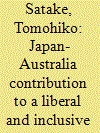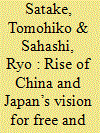|
|
|
Sort Order |
|
|
|
Items / Page
|
|
|
|
|
|
|
| Srl | Item |
| 1 |
ID:
116288


|
|
|
|
|
| Publication |
2012.
|
| Summary/Abstract |
How does America's greater focus on Asia impact the security policies of Japan and Australia? How does it change the nature of the Japan-US-Australia security partnership? This paper attempts to answer these questions by looking at Japanese and Australian responses to the Obama Administration's new security policy toward Asia called "rebalancing." After examining them, it argues that the regional allied response to America's new security posture has generated greater momentum for both allies to collaborate in wider areas in a more timely and effective way than before. It concludes asserting that, in the era of rebalance, Japan, the United States, and Australia have not only deepened their existing cooperation, but also have expanded potential areas of cooperation toward a more "dynamic" partnership
|
|
|
|
|
|
|
|
|
|
|
|
|
|
|
|
| 2 |
ID:
143909


|
|
|
|
|
| Summary/Abstract |
This article discusses how Japan and Australia could contribute to a liberal and inclusive order in the Asia-Pacific region. Critics argue that closer ties between Japan and Australia could undermine the stability of regional security, dividing Asia into ‘mutually hostile armed blocs’ consisting of US allies and China. Contrary to such a view, this article argues that deepening and enhancing Japan–Australia security cooperation could, if carefully managed, help to maintain an inclusive regional order based on institutions, norms and values, as well as a stable balance of power relations. In particular, the article contends that Japan and Australia can contribute to regional order by strengthening their ‘middle-power cooperation’ through regional capacity-building, institution-building, rule-making or norm-setting, and coalition-building, while supporting the US military presence in the region. It then concludes that, despite differing attitudes towards Beijing, Tokyo and Canberra can further contribute to the longevity of the current regional order by inclusive institutional architecture and liberal norms and values.
|
|
|
|
|
|
|
|
|
|
|
|
|
|
|
|
| 3 |
ID:
101962


|
|
|
|
|
| Publication |
2011.
|
| Summary/Abstract |
This paper analyzes US-Japan-Australia security relations in the 1990s. Since the establishment of the Trilateral Strategic Dialogue (TSD) in 2005, there have been a growing number of studies which focus on the TSD or bilateral security relations between Japan and Australia ( Terada, 2006; Williams and Newman, 2006; Tow et al., 2007; The National Bureau of Asian Research, 2008). The announcement of the Joint Security Declaration between Japan and Australia in 2006 also received wide attention from researchers interested in the security policies of each country or Asia-Pacific security in general ( Bisley, 2006; Sato, 2008; Cook and Shearer, 2009). These studies focus mainly on the current development of US-Japan-Australia or Japan-Australia security relations in various dimensions, such as peacekeeping, non-proliferation, disaster relief, and other forms of multilateral cooperation. In particular, many studies emphasize that Japanese and Australian contributions to the US-led 'global war on terror' significantly upgraded their respective alliance relations, leading to the creation of the TSD ( Jain and Bruni, 2006; Wolton, 2006). In comparison, few studies exclusively focus on security relations between the three countries in the 1990s.
|
|
|
|
|
|
|
|
|
|
|
|
|
|
|
|
| 4 |
ID:
178696


|
|
|
|
|
| Summary/Abstract |
Unlike the common view that sees FOIP as a containment strategy against China, this article argues that Japan’s FOIP vision seeks to maintain an open and inclusive regional order that incorporates all regional countries into a common framework. To realize such a vision, Japan has strengthened its regional order-building efforts with other regional like-minded countries. However, such efforts have limitations in terms of the resource shortage, legal constraints, and the lack of regional consensus. Unless Japan can address these challenges, the FOIP would end up being a mere utopian dream, rather than a meaningful vision or strategy that can prevent the emergence of a Cold War and maintain an inclusive and rules-based order in the region.
|
|
|
|
|
|
|
|
|
|
|
|
|
|
|
|
|
|
|
|
|